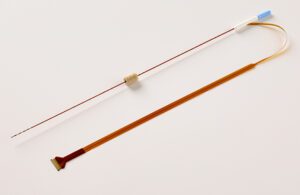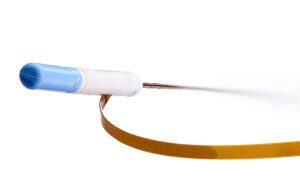
The NeuroOne Evo sEEG [Photo courtesy of NeuroOne]
NeuroOne is preparing its depth electrode technology for commercialization through Zimmer Biomet (NYSE: ZBH) while waiting for FDA feedback on its latest submission.
NeuroOne’s Evo stereoelectroencephalography (sEEG) device won FDA 510(k) clearance in September 2021 for recording, monitoring, and stimulation of electrical signals at the subsurface level of the brain.
That clearance was for temporary use (less than 24 hours), and NeuroOne applied in November to extend the duration of use to less than 30 days. The FDA denied that application in May, but said the company could try again with new subacute toxicity biocompatibility evidence.

NeuroOne CEO Dave Rosa [Photo courtesy of NeuroOne]
“We ran into a methodology issue or disagreement with them on the last test that we performed,” NeuroOne CEO Dave Rosa said in an interview with Medical Design & Outsourcing. “We did a different type of test this time that satisfies the same requirement. The good news is it’s a pass/fail test. You either show that you’re not toxic or that you are.”
The FDA usually reviews special 510(k) submissions within 30 days. NeuroOne filed on Aug. 8, more than a month ago.
“Every day I ask my regulatory consultant, ‘Have we heard from the FDA?’ but so far we haven’t gotten any feedback,” Rosa said.
NeuroOne’s deal with Zimmer Biomet

The NeuroOne Evo sEEG’s stylet [Photo courtesy of NeuroOne]
Eden Prairie, Minnesota-based NeuroOne isn’t the only one waiting on the extended duration approval.
Zimmer Biomet has an exclusive development and distribution agreement with NeuroOne for its thin film technology and is already selling NeuroOne’s earlier cortical strip and grid electrode devices. Zimmer Biomet placed initial stocking orders with NeuroOne more than a year ago to sell the Evo sEEG device to neurosurgeons.
“It would be the first thin-film sEEG … what we’re doing is taking an EKG of the brain,” Rosa said. “It’s just a different way of doing it. A doctor will drill directly into the brain tissue and then just advance these forward. It’ll be the first commercial device approved for that use.”
PREVIOUSLY: NeuroOne reports successful durability tests of thin-film electrodes
If NeuroOne’s Evo sEEG device gets an FDA nod for longer use, Zimmer Biomet will sell it to neurosurgeons for use in its Rosa One Brain robot-assisted neurosurgery system (no relation to the NeuroOne CEO, obviously). The robotic-assisted surgery system will help neurosurgeons with a craniotomy for the sEEG, with Rosa One drilling a small hole and the neurosurgeon physically placing and anchoring the electrode in the brain. Neurosurgeons can also use the Evo sEEG without robotic assistance.
Zimmer’s distribution deal with NeuroOne creates a new source of revenue for its robotic platform. Zimmer is waiting on its own FDA review of drill bits and related accessories, Rosa said.
“What Zimmer has today is the robot, but once you place the robot, there’s very little opportunity for them to generate additional revenue in the site,” Rosa said. “Now they’re going be able to walk in and say to the neurosurgeon, ‘I can provide everything that you need — the robot, as well as the disposable electrodes for you to do this case.’ So this is an important product for [Zimmer].”
Zimmer paid $3.5 million to NeuroOne under the deal last month, following an up-front payment of $2 million in 2020.
“If you have a large corporate or a large strategic that has signed an agreement and invested money — non-refundable money — into the company and it’s millions of dollars, it brings a greater sense of comfort,” Rosa said. “… On the development side, it brings a wealth of information that ultimately allows you to develop these technologies quicker than you would, you would if you didn’t have these relationships.”

The ribbon end of NeuroOne’s Evo sEEG device [Photo courtesy of NeuroOne]
NeuroOne also has support from the Mayo Clinic dating back to 2014. Mayo Clinic has invested in the company, tested its technology and was the first commercial user of the Evo cortical electrodes. Mayo Clinic neurologist Dr. Greg Worrel is the chair of NeuroOne’s Scientific Advisory Board.
“When you look at electrode companies, there are the small companies like ourselves, and then there’s the huge companies like Medtronic and Boston Scientific,” Rosa said. “They’re not going to need any financing. They’re not going to need any partnerships. … But when you’re a company like us in the early part of your company’s life cycle and you need to raise money, [these partnerships] bring and lend a lot more credibility for investors to take a serious look at us.”
NeuroOne’s initial markets for its thin film electrode technology include epilepsy, Parkinson’s disease and chronic back pain due to failed back surgeries, with potential for other related neurological disorders as well as research applications. The company is also exploring RF ablation for brain tissue and permanently implanted stimulation electrodes.